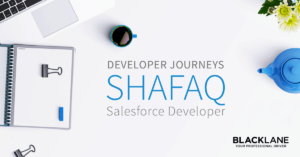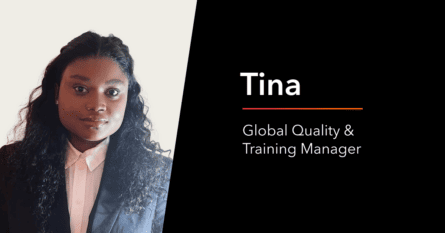This month, we’d like to introduce you to Shafaq. Shafaq is a Salesforce Developer. She joined Blacklane in November 2016.

Where are you from, and what is your minimum viable autobiography?
I am from Pakistan. I did my Software Engineering degree at the National University of Sciences and Technology (NUST) in Pakistan. I started freelancing as a JavaScript programmer whilst I was pursuing my undergraduate degree. As my interest in programming grew, I participated in a national startup-pitching competition, and my idea was chosen as the winner of the competition. I thereafter worked on my startup for a while, but then I fell in love with game programming. So I left my startup and started working on a virtual reality game project. I ended up winning a gold medal for that.
After much thought, I decided that it was important for me to gain some practical experience in the software development industry before I could venture into my own startup idea again. I thereafter started another job as an Android developer, and after three months, another company approached me for my Java skills and trained me in Salesforce. After a year of working on exciting Salesforce projects, I found myself in Berlin working at Blacklane as a Salesforce developer.
What does it mean to be a Salesforce developer? How does it compare to your previous roles?
Salesforce is basically a CRM — business-to-business, business-to-client — and we have different departments in our company that use it. We as Salesforce developers customize the system based on the requirements of each department. For example, when our customer care team receives a complaint or a ride request from a client, Salesforce stores it as a case. We created special, customized templates for these cases. So we help the various departments: Sales, Finance, Marketing, etc. We get all the data from customers, rides, all communication, if there are forms, emails, etc. Everything goes into Salesforce.
My team provides a system that all internal teams at Blacklane use. Salesforce is a full stack system. You have a frontend and a backend already. And then you build your own system. There are built-in solutions, but you can customize everything according to the needs of your own departments. It seems restrictive, and you have to work under a lot of constraints, but you still touch the frontend and the backend. We are limited in the programming languages we can use and the support we can get for different systems. I feel deprived sometimes in that way. I have to obey the rules of Salesforce. But other than that, it is equally challenging compared to other kinds of programming.
When did you realize you wanted to write code for a living?
That’s a funny story, actually. All my life, I wanted to be an architect, and the only thing I knew about computers at a younger age was that you can play video games on them and that there’s a Paint application for doodling. So, I applied to an architecture program and, as a safety net, I also applied to an engineering program at the same university — though not in any computer-related program. I was very careful about that. However, due to some administrative mixup, I found myself selected for the software engineering program. Since the architecture admission list was supposed to be announced later, I decided to give it a go. Two weeks later, I fell in love with programming and never looked back.
What brought you to Blacklane?
I wanted to move out of my homeland and experience a new culture, along with its new challenges. I found Blacklane to be one of those companies that fit with what I had in mind. They have an awesome product, and it is serving their customers in a brilliant way. I did a little bit of research, and I was impressed from the outset. I knew it would be an excellent place to work, and now I’m here.
As a developer, how do you feel about living and working in Berlin?
Berlin is amazing. It’s vibrant, it’s multicultural, and it’s now the home of some truly brilliant and creative minds from all over the world. If you are passionate about anything, you will find like-minded people in no time here.
I also love the diversity of Blacklane. It is just so fascinating every time I look at my team, because all my team members are from a different country. That’s one of the reasons why I thoroughly enjoy working in Berlin. You meet so many amazing people, and you learn so many new things.
Why do you enjoy staring at a screen for hours and hours every day, manipulating symbols that tell a machine what to do?
It feels empowering in a weird way! Just kidding.
I treat it like a platform to show the world what I am capable of. It’s a new challenge every day, and when you think about the impact you can have, just sitting and looking at a screen and creating something that is helping thousands of people, it’s a rewarding experience. Besides, telling a machine what you want it to do is kind of fun, too.
How do you find working on a team versus working alone?
I prefer working in a team more. Working in a team is always a win-win situation for me. My theory is that you can never know everything. So, when you are working in a team, you have different ideas and different approaches to solving a problem. You are constantly learning and growing.
Sometimes, though, I do enjoy working alone. It can be more peaceful, and I can complete my projects with undivided attention.
Do you have any favorite languages, technologies, or frameworks? What do you like about them? Are there any that you secretly despise?
I enjoy working with object-oriented languages. However, I prefer working with Apex in Salesforce, because it has a lower configuration overhead. I appreciate its intuitiveness in development, execution, and its extensive documentation. Apex is structured in a manner that pushes developers to become more efficient in coding processes and also aware of how to effectively utilize limited CPU resources.
On the other hand, I take a keen interest in gaming frameworks such as Unity. I enjoy being immersed in creating gaming environments from the design perspective to the code implementation. I despise platforms that require extensive effort in environment configuration. I simply like working with frameworks that can get me started on what I want to build as quickly as possible.
How would you describe Apex to another developer, who doesn’t know anything about Salesforce or Salesforce development?
It’s an object-oriented programming language derived from Java. If you know Java, you can work with it. You just need two weeks of training. You learn the frameworks, the limitations, the predefined database setup, objects, etc., and then you’re good to go.
If you could change one thing about Salesforce development, what would it be and why?
Salesforce can be a very constraining environment to work in. You have a set of boundaries that I do not see in the free world of coding. If I could, I would love to explore and introduce more of an all-you-can-create environment into Salesforce. People are already doing it by creating apps to enhance Salesforce functionality. I am working towards making my own contribution.
Do you see any common ground between your love of game development and your work with Salesforce?
I don’t see any common ground. The reason that I’m a Salesforce developer is that when I graduated in Pakistan, video game development was not as huge as it is now. Also, in my first interview for a game developer position in Pakistan, because I was a woman, I wasn’t offered as much as my male colleagues. I interviewed with a guy who was a designer. We were going to work on the same project, and we had the same educational profile, but he got a better salary offer for a developer position, because he was a man. And he was a designer, not a developer! He was my best friend, too, so he told me his salary. And I said, OK, I’m not doing it. It’s also a problem in Berlin, but it’s changing everywhere, even in Pakistan.
What are you looking for in a company when you’re considering a job? What is most important to you, and what is least important?
The work environment is the most important thing to me. I believe we spend more time living and working with our colleagues than with our families or friends. So if you are not happy in your workplace, it’d be tough to be generally happy in your life.
When you’re looking for a job, you’re considering the product and how you can build your career and if it will keep your interest for the next few years. But next is the workplace. If you work with good people, you’re on a good team, and have good people to supervise you and lead you in your career, then you can thrive. Table tennis is important. Foosball is important. I’m upset that our foosball table is broken. Air conditioning is important! Having free coffee and things like that is not important. People can pay a euro for their coffee. All the amenities you can get in the workplace are add-ons, but they aren’t a necessity. The environment is more important. And recognition.
What role do developers have in the world, do you think? Are we just passive code robots, or do we have responsibility for the impact of our work on society?
One of my professors used to say, “If you know how to write code, you can change the world by sitting on your living room sofa.” I found it to be true. It’s a liberating experience. In this era, our world is driven by software. A programmer has an active role to play when it comes to shaping societies and the future. Even if we take the example of Blacklane, we are providing a service to the world, and a major part of it is the software that we are building as engineers.
When I was growing up, we were taught never to talk to strangers. But now, we would rather trust an application than ask help from our friends and family. We would rather accept a ride from a complete stranger using apps like Uber or Careem. That explains the trust that people have for technology, and their dependence on it. This also holds people like us more responsible for their data, because a little slip could be a disaster. We have all heard about so many cases where a credit card or bank information was stolen from some company’s insecure database, leaving people broke. Data is as powerful as an atomic bomb. You can destroy people’s lives.
What is it like working in a different country, and culture, than the one in which you grew up?
It is different, and in a good way, too.
The culture is definitely different from what I experienced back in my own country. I have found it an excellent experience working in a different country — especially in a place like Berlin — because of the wealth of knowledge and experience I have encountered in the form of different creative people across the globe.
What do you imagine about your future? Where do you see yourself many years from now, and what do you hope to have accomplished?
Recognition in the tech world.
What would recognition mean? What are the challenges you feel you must overcome in order to gain that recognition?
I feel like I’m facing those challenges every single day as I grow in my career. As a person, I don’t plan long term. If you ask me where I want to be in five years — if you look at where I was five years ago, you will see that my plan didn’t work out at all. But recognition in the tech world is something you have to work towards slowly.
When I started out, women in the tech world, in general, were not as appreciated as men, and it was the same in Pakistan. I wanted to make a point that it’s OK to be a woman and a programmer. It doesn’t require super powers. A bunch of my friends did the same — so many of them followed me. I pushed them to do it. I said, “If I can do it, you can do it.”
If you’re a guy in a field where the majority of people are women, you will feel the same way. It depends on the people around you. When I first joined Blacklane, for two months, I didn’t talk to anyone outside my team. But then the people who were my supervisors pushed me to speak more and go outside my comfort zone. They gave me the confidence that I was missing. It’s amazing now. Your team members, your managers, they set a tone.
When you’re the only woman on a team, you need a little bit of a push. When you’re raised this way, it’s difficult to overcome it. And often male developers would just put up a curtain between us, because they aren’t used to talking to women. I was the only woman developer in the company when I joined Blacklane. Now, with the people I work with, I don’t have this problem. I don’t have this problem in meetings. Gender doesn’t factor into it.
I want to be an example that it’s fine to be who you are, no matter where you are from. You just have to do a little more than other people, depending on the environment you are in. You can always push harder to be in an environment where you have better options.
—
If you are interested in joining Blacklane, feel free to head over to our career page. You will not only find our open positions there but also even more reasons why you should work with us!


